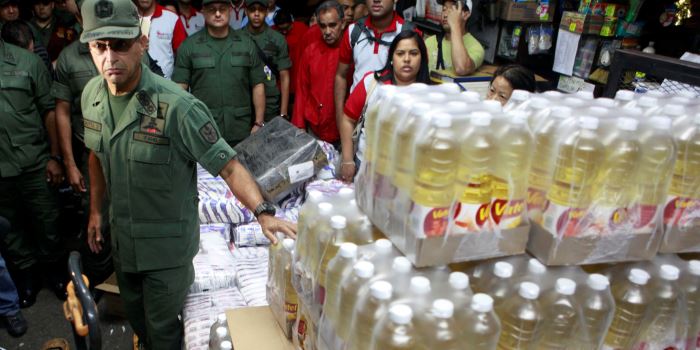EspañolThe Early Days of Hugo Chávez
Commander Chávez — just like Fidel Castro, his political and ideological mentor — succeeded in fooling a vast number of gullible citizens into believing that as coup leader he was a visionary from the romantic left. These individuals come up in Latin America every now and again and are never anything more than picturesquely irrelevant. One of the gullible was the then-President Rafael Caldera, who pardoned him in 1995, before the three years in prison established by the 1961 Constitution had elapsed. Had the Constitution been observed, Chávez would not have been a candidate in the 1998 elections.
Chávez pretended to be a man from the center-left, a follower of the Third Way advocated by the British Prime Minister, Tony Blair. He claimed he had a religious respect for the principles of private property, a mixed economy, the rule of law, an independent judiciary, human rights, and a moderately-sized state. Countless businesspeople, media professionals, and intellectuals did not give much importance to his speech at the University of Havana in 1995, when after being released from the Yare Prison, he declared that Cuba was “the sea of happiness,” which marked the beginning of his firm, indestructible alliance with Fidel Castro.
Video (Spanish): Part of Chávez speech during his first visit to Havana in 1994. He expresses his desire to carry out an integral cooperation with Cuba and Latin American integration.
In his December 6, 1998, speech at the Ateneo de Caracas, after the Supreme Electoral Council (CSE) had announced his victory that same day, Chávez took a moderate stance and instilled much optimism in a left that had felt desolate since the fall of the Berlin Wall and the collapse of the Soviet Union. After taking office, on February 2, 1999, and during his first year in power, he kept himself within the sober limits he had drawn on December 6.
The Shift Towards the Radical Left
As his term in office progressed and he succeeded in concentrating more and more power, El Commandante’s discourse became more radical. He no longer felt inclined to follow the Third Way. He started to question capitalism head-on, as well as the prevalence of exchange value over use value (an Marxist economic folly). Like Proudhon, the old French utopian socialist, he began to state that private property is theft. Nor did he believe that public powers should be independent anymore.
He leaned towards the Leninist theory of the state, as expounded with mediocre clarity by the head of the Russian Revolution in The State and Revolution. It contended that the state should be united around one single head, and the autonomy of its bodies is a bourgeois fiction fed by the capitalist class in order to perpetuate their grip on society.
Chávez also stopped addressing issues such as personal insecurity and ensuring the right to live.
Little by little, his modernizing, progressive, and apparently advanced discourse gave way to words that were loaded with resentment for the past and the status quo. Businesspeople became his favorite target. It was no longer about updating the obsolete industrial sector and transforming the agriculture industry to meet the demands of globalization and technological change; now it was about fostering communal property and founding the communal state.
That 21st Century Socialism utopia, however, never fully crystallized. Fierce social resistance and the official party’s incompetence and corruption have prevented the communist dream from coming true, but the seed of destruction perforated the defense system of society. After 15 years of the chavista regime, Venezuela is devastated by the backwardness of an ideology that has destroyed every country it has ever prevailed in.
2013: The Red Hell in Numbers
Given that it is impossible to cite all the data one might wish to, I shall offer only the most relevant figures with international comparisons. That will allow us to consider Venezuela’s situation relative to other similarly developed countries.
This year, the Venezuelan economy will grow only 1 percent, despite the fact that oil prices have stood at around US$100/barrel. The Economic Comission for Latin America and the Caribbean (ECLAC) projects that the region, on the other hand, will grow 3.5 percent. The irony is that Bolivia, which largely depends on Venezuela, will grow 5.4 percent.
In 2013, inflation is expected to soar to 45-50 percent, with an increase in food of over 70 percent, as stated by the figures release by Venezuela’s Central Bank itself. An independent inflation measures exceed 240 percent, and on the continent Argentina is the next worst at 39 percent.

Image: Ministerio del Poder Popular para la Comunicación y la Información
According to the International Property Rights Index prepared by the Property Rights Alliance, Venezuela is number 127 among 131 countries. And, in a ranking created by the Canadian Fraser Institute, we are last among the 144 nations in terms of economic freedom.
Instability or regime uncertainty has also rocketed. After Argentina, Venezuela is the riskiest country in the region for investments, as revealed by JP Morgan’s reports. Similarly, the World Economic Forum has us in 134th place among 148 economies in competitiveness, together with Chad and Burundi.
According to Transparency International, which prepares the Corruption Perception Index, Venezuela is one of the most corrupt countries in the world. More specifically, it is number 165 among the 174 countries considered, alongside Chad, Haiti, Iraq, and Turkmenistan.
To rub salt into the wound, it is one of the most violent countries as well. According to the Venezuelan Violence Observatory, by the end of 2013 there will be 73 deaths for every 100 thousand people. That is three times the rates of our neighbors, Colombia and Brazil.
Hugo Chávez’s 21st Century Socialism — maintained and reinforced by his heir, Nicolás Maduro, and its adherents in red — has only brought about chaos and destruction for Venezuela. The data do not lie.
 Versión Español
Versión Español












